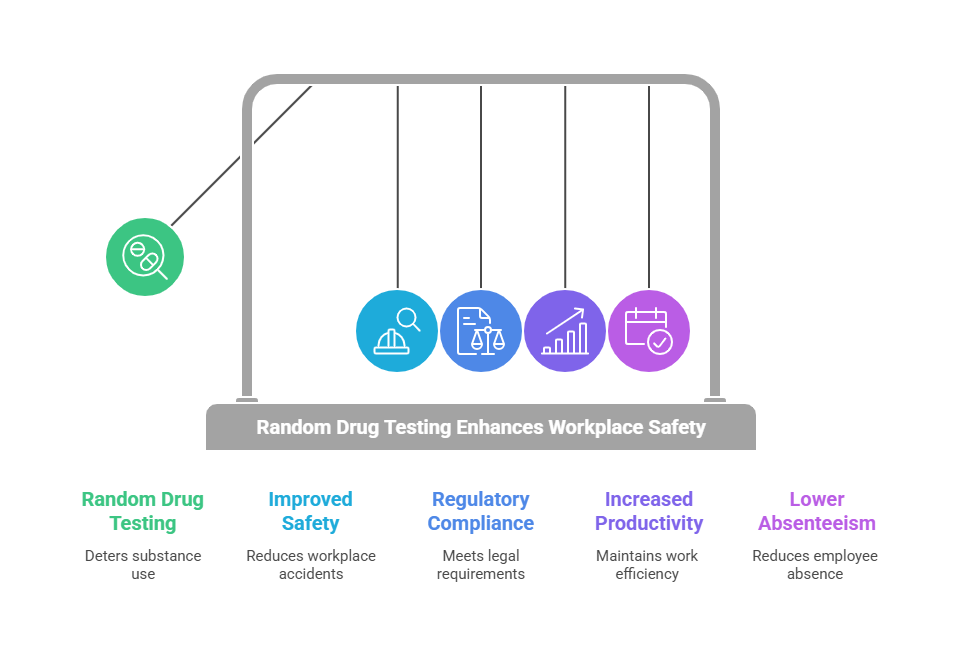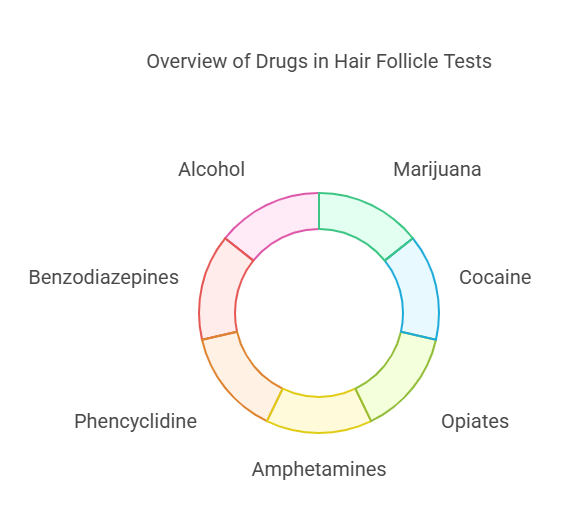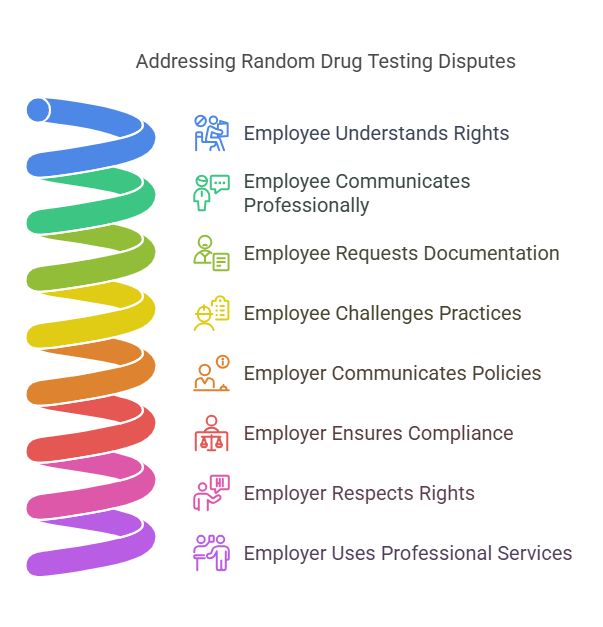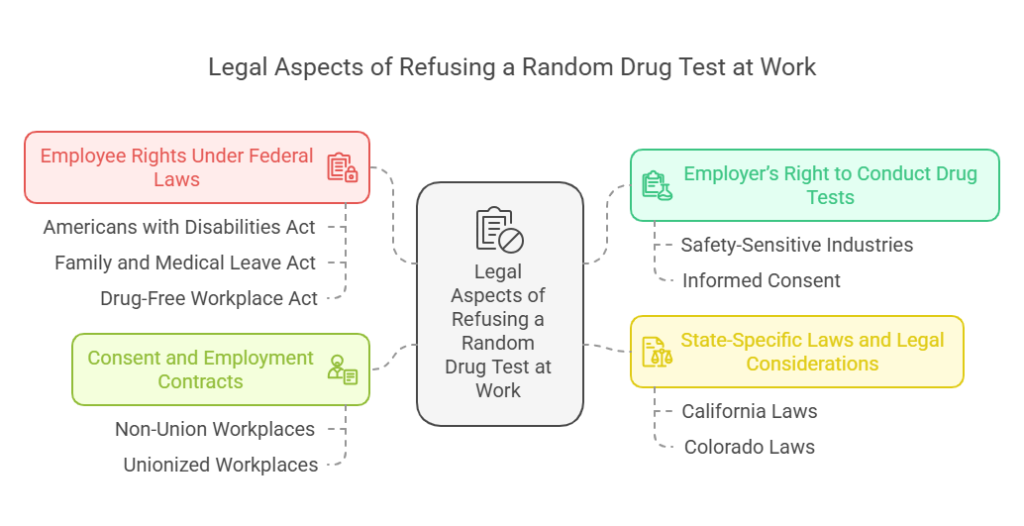Can I Legally Refuse a Random Drug Test at Work?

Understanding Random Drug Tests in the Workplace
In this section, we will explore the nature of random drug tests in the workplace, the reasons employers implement such testing policies, and how these tests differ from other types of drug testing. By understanding the importance of random drug testing, both employees and employers can navigate this aspect of employment more effectively.
What is a Random Drug Test?
A random drug test is a type of drug screening conducted by an employer in which employees are chosen without any prior notice or suspicion. The selection process is typically completely random, ensuring that no employees can predict when they will be tested. The goal of this type of testing is to detect drug or alcohol use that could impair an employee’s ability to perform their job safely and efficiently.
Random drug tests are often conducted in industries and job roles where safety and reliability are critical, such as those involving driving, operating heavy machinery, or working in environments where a lapse in judgment could lead to accidents.
Why Do Employers Implement Random Drug Testing Policies?

Employers implement random drug testing policies for a number of reasons, with safety being one of the most important considerations. The risks associated with drug or alcohol use in certain job roles can be extremely dangerous. Random testing helps deter employees from using illicit substances, as the uncertainty of when the next test will occur makes it difficult for employees to predict and potentially avoid being caught.
Here are a few common reasons employers use random drug testing:
- Safety concerns: To ensure employees are not under the influence of drugs or alcohol while performing safety-sensitive tasks (e.g., operating machinery, driving commercial vehicles).
- Compliance with industry regulations: Certain industries, such as transportation, aviation, and healthcare, are legally required to implement random drug testing to comply with federal or state regulations.
- Workplace productivity: To maintain a productive and efficient work environment, especially where employees are expected to perform at high standards and meet deadlines.
- Reducing absenteeism and accidents: Random drug tests help reduce instances of absenteeism and prevent accidents related to drug use on the job.
Industries That Commonly Require Random Drug Testing
Certain industries and job positions require random drug testing due to the potential hazards associated with drug use on the job. These industries prioritize the safety of their employees and the public, making random drug testing a key component of their workplace policies. Here are some examples:
| Industry | Common Job Roles | Why Random Drug Testing is Necessary |
|---|---|---|
| Transportation | Truck drivers, pilots, train operators | To ensure safety while operating vehicles and machinery. |
| Healthcare | Nurses, doctors, paramedics | To prevent impairment that could compromise patient safety. |
| Construction | Heavy machinery operators, crane operators | To avoid accidents and ensure proper functioning of equipment. |
| Aviation | Airline staff, ground crew, air traffic controllers | To prevent accidents in aviation-related work. |
| Manufacturing | Factory workers, machine operators | To ensure employees are not impaired while using machinery. |
| Law Enforcement | Police officers, correctional officers | To maintain discipline and professionalism in safety-critical roles. |
In these industries, random drug testing plays a crucial role in minimizing risks and ensuring that employees are fit for duty. Failure to comply with drug-free workplace policies could result in accidents, legal issues, or compliance violations.
How is a Random Drug Test Different from Other Types of Drug Tests?
Random drug testing differs significantly from other types of drug tests such as pre-employment, post-accident, and reasonable suspicion drug tests. Here’s a comparison of these different drug test types:
| Test Type | Description | When it’s Administered |
|---|---|---|
| Random Drug Test | Employees are selected at random for testing. | Periodically, with no prior warning. |
| Pre-Employment Drug Test | A test conducted as part of the hiring process. | Before the employee begins their job, typically during the hiring process. |
| Post-Accident Drug Test | Administered after an accident or injury occurs at work. | After an employee is involved in a workplace accident. |
| Reasonable Suspicion Test | Conducted when an employer believes an employee is impaired. | Based on specific observations or behavior that suggest impairment. |
While pre-employment drug tests are typically a one-time requirement to screen for drug use before an employee starts work, post-accident drug tests are focused on determining whether drugs or alcohol played a role in an incident. Reasonable suspicion tests are conducted when an employer has cause to believe that an employee is under the influence, based on observable behavior. On the other hand, random drug tests are unpredictable and are meant to deter substance use on the job by making it difficult for employees to plan for the test.
Drugs Commonly Tested in a Hair Follicle Drug Test

Random drug tests can screen for a wide variety of illicit substances. Here are some of the most commonly tested drugs in a random drug test:
- Marijuana (THC): Marijuana is one of the most frequently tested substances. While marijuana use may be legal in some states, it is still prohibited in the workplace for safety-sensitive positions.
- Cocaine: Cocaine use can have serious side effects that impair cognitive function and motor skills.
- Opiates (e.g., heroin, morphine, codeine): These drugs are highly addictive and can significantly impair an employee’s ability to function properly at work.
- Amphetamines (e.g., methamphetamines, Adderall): Often used recreationally or as performance enhancers, these substances can affect judgment and coordination.
- Phencyclidine (PCP): A powerful hallucinogen that can cause severe impairment.
- Benzodiazepines (e.g., Xanax, Valium): These prescription drugs can be tested for, particularly if there are concerns about misuse.
In some cases, employers may also test for alcohol as part of random testing policies, especially in industries where alcohol consumption is a major concern, such as transportation.
The Process of a Random Drug Test
When an employee is selected for a random drug test, the process typically follows these general steps:
- Notification: The employee is notified (usually in person) that they have been selected for a random drug test.
- Collection of Sample: Depending on the type of test, the employee will be asked to provide a urine sample, saliva sample, hair follicle sample, or blood sample. The most common sample used is urine.
- Testing at a Laboratory: The sample is sent to a certified laboratory, where it is analyzed for the presence of illegal drugs and other substances.
- Result Notification: Once the results are available, the employer is notified, and the employee is informed whether they passed or failed the test.
Employers may implement additional steps to ensure the integrity of the testing process, such as requiring a witness to the sample collection, ensuring the sample is not contaminated, or conducting observed collections to prevent cheating.
Can I Refuse a Random Drug Test at Work?
In most circumstances, employees cannot refuse a random drug test at work if it is part of their employer’s established policies. Random drug testing is typically a condition of employment, especially in industries or job positions that require it for safety and compliance reasons. Refusing a random drug test may be viewed as a violation of workplace rules, and in many cases, it can lead to disciplinary action, including termination.
However, there are specific exceptions where refusal may be allowed, depending on the circumstances, such as:
- Lack of proper notice or unclear policy: If the employer fails to provide proper notice, explain the testing process, or has unclear policies in place regarding drug testing, employees may be able to refuse.
- Medical or disability-related issues: Under certain conditions, an employee may refuse a drug test if they have a medical or disability-related reason. For instance, if an employee has a medical condition that makes providing a sample (e.g., urine or blood) difficult or impossible, they may need to present a valid reason or medical documentation.
- Illegal testing procedures: If the employer does not follow proper legal protocols during the test (e.g., not having a certified collector or using unapproved methods), employees may have a legal basis for refusing the test.
What Happens if I Refuse a Random Drug Test at Work?
Refusing a random drug test can have serious consequences for employees, particularly if the refusal violates company policies or legal requirements. Here’s what may happen if an employee refuses:
- Disciplinary Action: Employers may impose penalties for refusal, which could include suspension or termination. Some employers have zero-tolerance policies, which mandate immediate dismissal for refusing a drug test.
- Violation of Company Policy: If the employee is under a signed employment contract or subject to a collective bargaining agreement (union contract), refusing the test may constitute a breach of contract, which could lead to additional legal action or penalties.
- Ineligibility for Employment: In some cases, especially if the refusal occurs during pre-employment screening, the individual may be disqualified from consideration for the job.
What Legal Protections or Exemptions Exist for Refusing a Random Drug Test?
While refusal may generally result in disciplinary actions, there are certain situations where legal protections exist that could prevent employers from punishing an employee for refusal:
- Americans with Disabilities Act (ADA): Under the ADA, employees who have a disability that prevents them from taking a drug test (e.g., a medical condition that affects their ability to provide a sample) may be protected. Employers are required to provide reasonable accommodations for disabled employees unless doing so would cause significant hardship for the business.
- State-Specific Laws: Some states have laws that provide employees with additional protections. For instance, certain states may require that drug testing policies be clearly communicated to employees or provide exemptions for specific reasons (e.g., religious beliefs, medical issues, etc.). Employees should consult their state’s labor laws to determine their rights.
- Employment Contracts: If an employee has a specific employment contract or is part of a union, there may be provisions that affect the employer’s ability to enforce drug testing. Some contracts may outline the procedure for drug testing, how often it can occur, and whether refusal is grounds for termination.
- Union Agreements: If an employee is represented by a union, the union’s collective bargaining agreement (CBA) may address the issue of drug testing. The CBA may provide conditions under which drug tests can be refused, or outline procedures to be followed if the test is contested.
The Role of Precise Hire in Drug Testing Compliance
Precise Hire is a provider that specializes in drug testing and background screening services for employers. By partnering with a trusted drug testing service like Precise Hire, employers can ensure their drug testing policies comply with all applicable state and federal regulations. Additionally, Precise Hire can help businesses clearly communicate drug testing procedures to employees, ensuring transparency and legal compliance.
For employees, working with a third-party provider like Precise Hire can also help them understand their rights, including the conditions under which they can refuse a drug test and what legal protections may be available to them.
Guidance for Employees and Employers on Addressing Random Drug Testing Disputes

Disputes or misunderstandings surrounding random drug tests can arise, especially when employees feel the test is unfair or discriminatory. Here are some tips for both employers and employees on how to address such issues:
For Employees:
- Understand Your Rights: Familiarize yourself with your employer’s drug testing policy and any applicable state or federal laws. If you’re unsure about your rights, consider seeking legal advice or consulting with a union representative (if applicable).
- Be Professional: If asked to take a drug test, approach the situation professionally and respectfully. If you have valid reasons for not taking the test (e.g., medical conditions), clearly communicate this with your employer.
- Ask for Documentation: If the test or procedure feels unclear or unjust, request written documentation explaining the employer’s testing policies and procedures.
- Challenge Unfair Practices: If you feel that the drug testing process is being misused or is discriminatory, it’s crucial to report these concerns to Human Resources (HR) or seek legal assistance.
For Employers:
- Be Transparent: Clearly communicate your drug testing policies in writing, outlining the consequences of refusal and the steps employees must follow to comply with the process. Include details about random selection, testing procedures, and the substances being tested for.
- Ensure Legal Compliance: Ensure that your drug testing practices comply with all relevant laws, including the Americans with Disabilities Act (ADA) and the Family and Medical Leave Act (FMLA). Failure to comply with these laws could lead to legal issues.
- Respect Employee Rights: Allow employees to ask questions about the process, and be prepared to explain their rights and obligations. Make sure they understand the potential consequences of refusing a drug test.
- Use Professional Services: Work with professional drug testing providers like Precise Hire to ensure that your testing process is fair, accurate, and legally compliant.
Legal Aspects of Refusing a Random Drug Test at Work

Refusing a random drug test at work can have legal implications. Employers must follow the law when implementing drug testing policies, and employees must understand their rights to avoid potential violations. The legal framework surrounding drug testing can vary based on federal, state, and local laws. Here are key aspects of the legal considerations involved:
1. Employer’s Right to Conduct Drug Tests
Under most circumstances, employers have the right to impose random drug tests, particularly in industries where safety and security are paramount. These industries include transportation (e.g., trucking, aviation), healthcare (e.g., medical personnel), and positions involving the operation of heavy machinery. Employers can require drug testing as part of their safety policies or to ensure that employees are fit for duty.
However, the employer must ensure that the random drug testing policy is clearly stated in the employee handbook or employment contract. Informed consent is a critical element in ensuring that employees are aware of the testing process and its consequences.
2. Employee Rights Under Federal Laws
Several federal laws may intersect with drug testing policies, offering certain protections for employees:
- Americans with Disabilities Act (ADA): This law protects employees from discrimination based on disabilities. If an employee has a medical condition or disability that prevents them from taking a drug test, the employer may be required to provide reasonable accommodations. However, the employer still has the right to test for drug use, as long as they adhere to the ADA guidelines.
- Family and Medical Leave Act (FMLA): Employees taking leave under the FMLA may be subject to drug testing, especially if they return to work in a safety-sensitive role. However, testing cannot be punitive and must follow the employer’s established policies.
- Drug-Free Workplace Act: For employers that receive federal funding or grants, this act mandates that they maintain a drug-free workplace, which includes the right to randomly test employees for drugs.
3. State-Specific Laws and Legal Considerations
In addition to federal laws, states may have specific laws that affect drug testing practices. Some states have strong protections for employees, particularly regarding the legalization of marijuana. In these states, employers may still conduct drug tests but may not be able to take action based solely on the presence of marijuana in the employee’s system, especially if the drug use occurs outside of working hours and does not impair job performance.
For example:
- California: Under California’s Fair Employment and Housing Act (FEHA), employers cannot discriminate against employees for using medical marijuana. However, they can still implement policies that prohibit the use of drugs while on duty.
- Colorado: In Colorado, employees may be protected from discrimination based on marijuana use if the use does not affect job performance. However, employers in safety-sensitive positions have the right to test for marijuana and take action if the drug is detected.
Employees should familiarize themselves with state-specific laws regarding drug testing to understand whether they have protections related to refusal or drug use.
4. Consent and Employment Contracts
The concept of consent plays a significant role in drug testing policies. By accepting an employment offer, employees often consent to undergo drug testing as part of their contractual obligations. In non-union workplaces, employers generally have the right to impose random drug tests, but they must ensure that the process is clearly explained, and employees are fully informed.
For employees in unionized workplaces, the collective bargaining agreement (CBA) may outline specific provisions regarding random drug testing. In these cases, the union and employer will negotiate the terms of the testing, and employees may have a better understanding of their rights when it comes to refusing a test.
FAQs About Random Drug Tests and Refusing Them
Here are answers to some of the most frequently asked questions about random drug testing and the ability to refuse:
What happens if I refuse a random drug test at work?
If you refuse a random drug test at work, the consequences can vary depending on your employer’s policies. Typically, refusal may result in disciplinary action, which can range from a written warning to termination. Refusing a drug test may be seen as a violation of your employment contract or company policy, especially in industries that rely on drug-free workplace standards.
Can my employer fire me for refusing a drug test?
Yes, in many cases, employers have the right to terminate employees who refuse to take a random drug test. Employers often include drug testing clauses in their employment contracts or policies, which employees agree to when accepting the job. Refusal to comply with these policies can lead to immediate dismissal, particularly in safety-sensitive positions.
Are there any exceptions where I can refuse a random drug test?
Yes, there are exceptions where you may be able to refuse a drug test, such as:
- If the drug testing process violates the company’s policies or is not conducted in accordance with legal guidelines.
- If you have a medical condition that prevents you from taking a test, you may need to provide documentation to support your claim.
- In certain states, laws may provide exemptions or limit an employer’s ability to take action based on drug test results.
Can a drug test result in my termination if it’s positive?
Yes, in most cases, a positive drug test result can lead to termination, particularly if the employer has a strict zero-tolerance policy. However, employers must follow the established procedure and ensure that the test is valid. If there is a dispute over the test results, employees may have the opportunity to request a retest or challenge the result.
How can I know if my employer's drug testing policy is legally compliant?
To ensure that your employer’s drug testing policy is legally compliant, review the employee handbook or your employment contract. The policy should outline the process for drug testing, including when and how tests are conducted, the substances being tested, and the consequences of refusal or positive results. Employers should also comply with state and federal regulations, including those regarding privacy, consent, and discrimination.
What happens if I refuse a random drug test at work?
If you refuse a random drug test at work, the consequences can vary depending on your employer’s policies. Typically, refusal may result in disciplinary action, which can range from a written warning to termination. Refusing a drug test may be seen as a violation of your employment contract or company policy, especially in industries that rely on drug-free workplace standards.
Can my employer fire me for refusing a drug test?
Yes, in many cases, employers have the right to terminate employees who refuse to take a random drug test. Employers often include drug testing clauses in their employment contracts or policies, which employees agree to when accepting the job. Refusal to comply with these policies can lead to immediate dismissal, particularly in safety-sensitive positions.
Are there any exceptions where I can refuse a random drug test?
Yes, there are exceptions where you may be able to refuse a drug test, such as:
- If the drug testing process violates the company’s policies or is not conducted in accordance with legal guidelines.
- If you have a medical condition that prevents you from taking a test, you may need to provide documentation to support your claim.
- In certain states, laws may provide exemptions or limit an employer’s ability to take action based on drug test results.
Can a drug test result in my termination if it’s positive?
Yes, in most cases, a positive drug test result can lead to termination, particularly if the employer has a strict zero-tolerance policy. However, employers must follow the established procedure and ensure that the test is valid. If there is a dispute over the test results, employees may have the opportunity to request a retest or challenge the result.
How can I know if my employer's drug testing policy is legally compliant?
To ensure that your employer’s drug testing policy is legally compliant, review the employee handbook or your employment contract. The policy should outline the process for drug testing, including when and how tests are conducted, the substances being tested, and the consequences of refusal or positive results. Employers should also comply with state and federal regulations, including those regarding privacy, consent, and discrimination.
Conclusion
Refusing a random drug test at work is generally not advisable, as it can lead to termination or other serious consequences. However, there are legal protections in place for employees, such as those offered by the Americans with Disabilities Act (ADA) and state-specific laws. Understanding your rights and responsibilities, as well as the legal framework surrounding drug testing, is crucial for both employers and employees.
Employers should have clear, written policies regarding drug testing and ensure compliance with legal regulations. Employees should know their rights and be aware of the potential consequences of refusal. If you’re an employer, consider working with a professional service provider like Precise Hire to ensure that your drug testing procedures are legally compliant and fair. Precise Hire can help you navigate the complexities of drug testing while promoting a safe and drug-free workplace.
By fostering transparency, clear communication, and adherence to legal guidelines, both employers and employees can navigate random drug testing policies effectively and responsibly.
